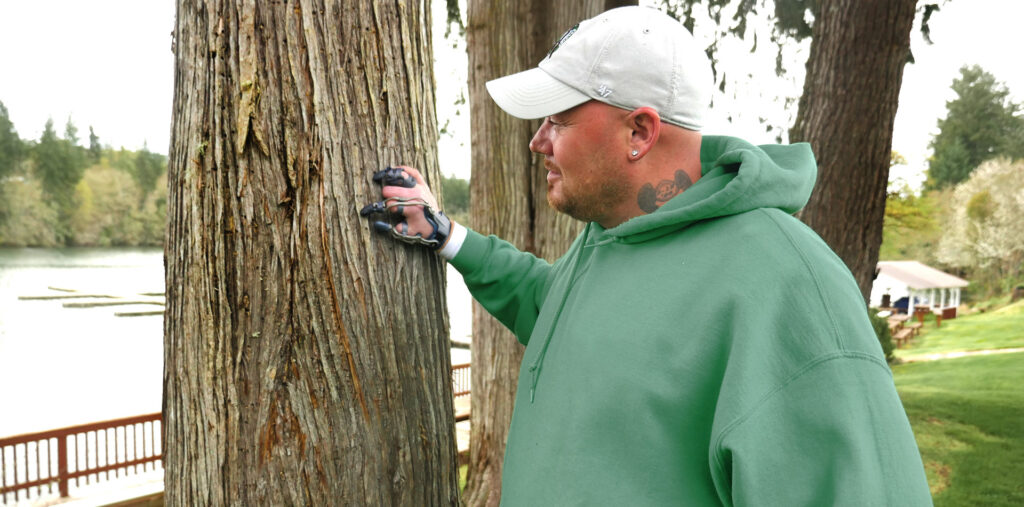Matt Finney was a proud new father.
He worked as a concrete finisher who enjoyed fishing and riding his motorcycle. So, when four of the five digits on Matt Finney’s right hand were partially amputated due to vascular occlusion in his right arm, it’s an understatement to say his life was changed.
In addition to not being able to work, Matt was unable to dress himself or cut his own food; nor was he able to change diapers or even pick up his 3-month-old son. The inability to support himself and his family financially, coupled with feeling debilitated both physically and psychologically by his amputation, Matt fell into a deep depression and back to a previously overcome and harmful addiction to drugs.
Matt recalls the dread following his amputation. “I remember feeling just completely filled with fear after my amputation … I had very little hope for myself.”
Up to 94 percent of individuals with mutilating hand injuries experience symptoms associated with stress and anxiety disorders, major depression, pain syndromes, and adjustment problems. Patients who have undergone trauma to their hand in the work setting seem to be particularly vulnerable to the development of significant anxiety. Additionally, because the work setting is often a major source of positive satisfaction and social interaction, the traumatic effect is compounded when this source of self-esteem is lost. Consequently, a further consideration in any partial hand intervention is the restoration of psychosocial wellness.
“The doctors are interested in closing the wounds, hand therapists hurt you to help, the prosthetist wants fits and function – and then the job is done,” says Bert Morris, a multi-digit amputee. “It has a huge psychological effect, and nobody addresses it.”
We know, as Matt and Bert intimately do, that our hands serve many roles. In addition to being the most versatile end effectors in the world, they serve as a means of connecting emotionally and socially with others, and expressing or representing feelings, thoughts, or symbolic aspects of one’s self. Disfigurement of the hands can cause profound changes to an individual’s sense of well-being. It can lead to social ostracization, agoraphobia, problems with routine social interactions, and a psychological conflict between body image and what the ego maintains as ideal.
Bert’s injury was due to an accident on the farming fields. He recalls laying in the hospital for three days before surgery and wishes desperately that someone would have helped him prepare for the shock of seeing his hand after amputation.
“It hit me over the head like a brick,” says Bert when they unwrapped his hand. “I run into people every day where I have to shake hands. My handshake is like my business card. People are going to touch my hands, and they are going to think I’m some kind of freak.”
Matt felt the same, stating his injured hand and the response it got from strangers left him self-conscious and sometimes he avoided people.
Naked Prosthetics’ Solutions
At the digit level, where 88 percent of partial hand amputations occur, for decades the only solution has been realistic silicone cosmetic restoration. While this offers some psychosocial benefit, the lack of function with these prostheses mean the adoption rate is low.
Now, there’s solution for both the functional and psychosocial benefits needed from a prosthetic finger or thumb. Naked Prosthetics’ devices restore natural motion, dexterity, and strength to people with partial digit amputations. Identified in qualitative and emerging quantitative studies, these digits are also restoring confidence. Especially when coupled with supportive therapies, a wearer’s ability to return to a desired sense of normalcy is attainable.
There are three products currently available that cover all levels of partial finger amputation: the PIPDriver, the MCPDriver, and the ThumbDriver. Operated by the user through intuitive movement and driven by intact joints, these prostheses require little acclimation and restore both digit dexterity and hand strength. There is no need for specialized training, and users report that with time these prostheses begin to feel like an endogenous extension of the body.
Bert now wears a ThumbDriver and PIPDriver. “My prosthetics and time have made things much better,” he says. “I have a lot more confidence. If I didn’t put these on in the morning, I’d feel like very self-conscious. My devices significantly reduce that self-consciousness.”
Within a month of acquiring his ThumbDriver, MCPDriver, and a PIPDriver, Matt was fully back to work using both hands. He continues to regain strength and can shake hands again. Plus, help with the kids, even changing diapers.
Adapting to the device was easy. “It works so well that I wear it pretty much all the time,” Matt says. “I was amazed at what I could do. The more I do, the more I count on this like it’s my real hand.” Matt says his hand still attracts attention, but now the attention is positive. “It’s done so much more for me than I thought it would — not just because of how I can use it, but the way it makes me feel about myself.”
These days, clear of his addiction, and contributing not only to his family’s well-being, but also contributing to the mental health of other amputees via online support, Matt says, “I feel like I’m a king. I’m very confident in myself.”


